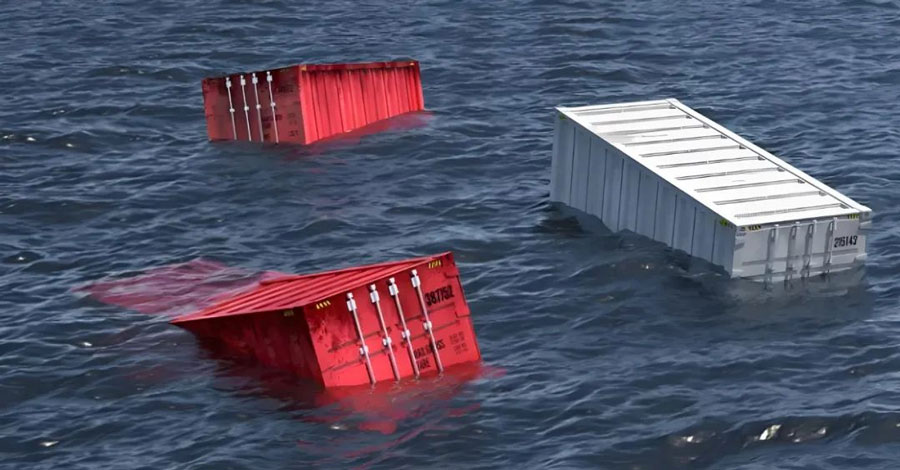

The diversion caused more than 200 containers to fall into the water
About 200 containers have been lost off the coast of South Africa in just two months in what has been described as "the most unforgiving sea on Earth", according to consultants at a cargo insurance conference in London. This data has attracted widespread attention.
The incidents include the loss of 44 containers on CMA CGM's Benjamin Franklin in July 2024; A month later, the company's Belem lost another 99 containers in a storm near Richard Bay. In addition, although the Ultra Galaxy is not a container ship, it broke up in bad weather and was declared a total loss, further highlighting the serious challenges in this area.
Burtham further noted that in order to avoid threats in the Red Sea region, many ships choose to circumnavigate Africa. However, this choice is not without consequences. Not only does the detour add at least 3,500 miles to the journey, it also takes an additional 10 to 14 days, putting a huge strain on the supply chain. At the same time, ships that choose this route will also face some of the harshest sea conditions on Earth, where there are often abnormal waves, sometimes even making the ship tilt about 20 degrees.
While attempting to avoid certain risk areas, shipowners and charterers should be fully aware of the challenges posed by circumnavigating Africa. These challenges include the increased financial burden of additional fuel and delays, potential salvage costs, and threats to the environment in the event of an otherwise avoidable accident. For example, plastic particles released from fallen containers pose a threat to Marine life and can contaminate beach environments. "This is not just a number on paper, it has a profound impact in the real world," Mr Burtham stressed.
According to the World Shipping Council, 221 of the 250 million containers shipped globally in 2023 were lost at sea, the lowest number ever recorded. The number of containers lost in the water in 2022 is 661. However, given the threats in the Red Sea region and the challenges posed by bypassing Africa, this number is likely to rise in the future.
The threat in the Red Sea has been present since October 2023, when the Houthis attacked commercial vessels linked to Israel. Despite the recently declared ceasefire, the new tensions could still lead operators to insist on alternative routes bypassing Africa. Therefore, relevant parties need to pay close attention to this development and take corresponding countermeasures to reduce risks.

The incidents include the loss of 44 containers on CMA CGM's Benjamin Franklin in July 2024; A month later, the company's Belem lost another 99 containers in a storm near Richard Bay. In addition, although the Ultra Galaxy is not a container ship, it broke up in bad weather and was declared a total loss, further highlighting the serious challenges in this area.
Burtham further noted that in order to avoid threats in the Red Sea region, many ships choose to circumnavigate Africa. However, this choice is not without consequences. Not only does the detour add at least 3,500 miles to the journey, it also takes an additional 10 to 14 days, putting a huge strain on the supply chain. At the same time, ships that choose this route will also face some of the harshest sea conditions on Earth, where there are often abnormal waves, sometimes even making the ship tilt about 20 degrees.
While attempting to avoid certain risk areas, shipowners and charterers should be fully aware of the challenges posed by circumnavigating Africa. These challenges include the increased financial burden of additional fuel and delays, potential salvage costs, and threats to the environment in the event of an otherwise avoidable accident. For example, plastic particles released from fallen containers pose a threat to Marine life and can contaminate beach environments. "This is not just a number on paper, it has a profound impact in the real world," Mr Burtham stressed.
According to the World Shipping Council, 221 of the 250 million containers shipped globally in 2023 were lost at sea, the lowest number ever recorded. The number of containers lost in the water in 2022 is 661. However, given the threats in the Red Sea region and the challenges posed by bypassing Africa, this number is likely to rise in the future.
The threat in the Red Sea has been present since October 2023, when the Houthis attacked commercial vessels linked to Israel. Despite the recently declared ceasefire, the new tensions could still lead operators to insist on alternative routes bypassing Africa. Therefore, relevant parties need to pay close attention to this development and take corresponding countermeasures to reduce risks.





